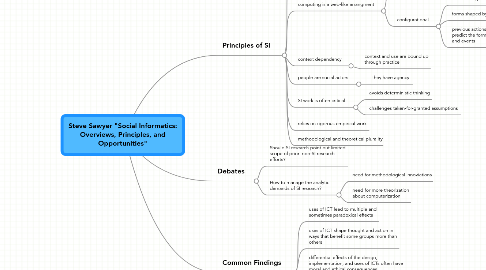Steve Sawyer "Social Informatics: Overviews, Principles, and Opportunities"
作者:Stephen Francoeur


1. Principles of SI
1.1. SI is problem-oriented
1.2. computing is a web-like arrangment
1.2.1. material artefacts
1.2.1.1. computers and software
1.2.1.2. rules, norms, practices of people
1.2.2. configurational
1.2.2.1. forms change over time
1.2.2.2. forms shaped by social milieu
1.2.2.3. previous actions and events guide but do not predict the forms and shapes of future actions and events
1.3. context dependency
1.3.1. context and use are bound up through practice
1.4. people are social actors
1.4.1. they have agency
1.5. SI work is often critical
1.5.1. avoids deterministic thinking
1.5.2. challenges taken-for-granted assumptions
1.6. relies on rigorous empirical work
1.7. methodological and theoretical plurality
2. Common Findings
2.1. uses of ICT lead to multiple and sometimes paradoxical effects
2.2. uses of ICT shape thought and action in ways that benefit some groups more than others
2.3. differential effects of the design, implementation, and uses of ICTs often have moral and ethical consequences
2.4. design, implementation, and uses of ICTs have reciprocal relationships with the larger social context
2.5. the phenomenon of interest will vary by the level of analysis
3. Debates
3.1. Should SI research point out limited scope of prior non-SI research efforts?
3.2. How to manage the analytic demands of SI research?
3.2.1. need for methodological innoviations
3.2.2. need for more theorization about computerization
